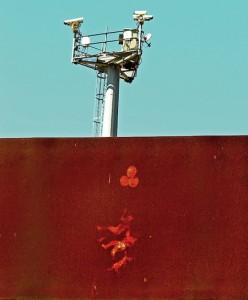Intereses corporativos en la frontera México-EU

Image: Brooke Binkowski
Within the framework of the “Immigration Industrial Complex,” corporate interests have become interconnected with immigration and border enforcement policy and legislation. Increasing “alliances” of private prison corporations, defense contractors and technology companies with government actors and agencies–elected officials, U.S. Immigration and Customs Enforcement, the Department of Homeland Security and the Border Patrol–have engendered a “hyper-militarization” of the border that continues today as more and more money is spent under the banner of “enforcement.” This nexus of spending, political action and corporate involvement further undermines meaningful immigration reform while simultaneously promoting the violation of human rights at the border.
As explained in depth in the Border Militarization Policy section, since the 1920s, the US-Mexico border has been home to expansive military and defense development through various government initiatives, much of which has only increased in scope since 9/11. This site is largely shaped by what is becoming known as the “Immigration Industrial Complex,” which combines facets of the prison industrial complex and the military industrial complex. These networks make use of the War on Terror and War on Drugs narratives in order to demonize and ostracize migrants and legitimize border enforcement, in turn escalating the violation of migrants’ rights in the name of profit. The following sections aid in understanding corporate interests at the border.


